![]() 1st Battalion 22nd Infantry
1st Battalion 22nd Infantry ![]()
After Transition Regulars Mission Remains the Same
Mission, operations remain same for ‘Regulars’ Soldiers in Baghdad’s Rashid
Sgt. 1st Class Brent Williams
1st BCT PAO, 4th Inf. Div., MND-B
FORWARD OPERATING BASE FALCON,
Iraq – When the patrol leader arrived at the Iraqi Army
command post to link up
with his Iraqi Security Forces counterparts, he found only one
junior officer awaiting his arrival; there would be no security
patrol
this particular morning he was informed.
There were no IA soldiers
available for the daily patrol because unbeknownst to the
Soldiers assigned to the 1st Brigade Combat Team,
4th Infantry Division, Multi-National Division – Baghdad,
the ISF were conducting a battalion-level cordon and search
operation
at the order of the Baghdad Operations Center – without
Coalition Forces.
1st Lt. Robert Ganim, a platoon
leader assigned to Company B, 1st Battalion, 22nd
Infantry Regiment, 1st BCT, 4th Inf. Div.,
said the predicament was the first time since the implementation
of Iraq’s Security Forces Agreement that he did not know
what to do.
“What would be the mission without the ISF in tow?”
asked Ganim, a native of Cleveland, calling his company commander
for guidance.
Eventually, the IA soldiers did both, providing a truck to
accompany the Soldiers of “Bear” Company to assess
security needs
for potential polling sites to be used in the upcoming provincial
elections.

FORWARD OPERATING BASE
FALCON, Iraq — 1st Lt. Robert Ganim, a platoon leader from
Cleveland,
assigned to Company B, 1st Battalion, 22nd Infantry Regiment,
discusses the plan of action for early morning
combined cordon and search operations Jan. 8 with 2nd Lt. Hamed,
1st Battalion, 24th Brigade, 6th Iraqi Army Division,
in the Saydiyah community of the Rashid district in southern
Baghdad. The Soldiers of Co. B, 1st Bn., 22nd Inf. Regt.,
part of the 1st Brigade Combat Team, 4th Infantry Division,
Multi-National Division – Baghdad, searched abandoned houses
looking for hidden weapons caches in the community once populated
by Ba'ath Party officials and Saddam's Regime.
(U.S. Army photo by Sgt. 1st Class Brent Williams, 1st BCT PAO, 4th Inf. Div., MND-B)
The ISF still need the help of
the Americans with the critical things, the “extreme”
things, said Capt. Monqaith, 4th Co., 1st Bn., 24th Bde.,
6th IA Div., but for the Iraqi units that have taken increasingly
more control for Baghdad’s security operations, there is
very little change.
“We have more control of our country now,” he said,
“and we have our friends, the Americans; they cannot go out
on patrol without us.”
The Iraqi Army soldiers in his unit feel that they are
independent and in control, he said, in comparison to last year,
when the ISF could not do anything without the support of
Coalition Forces. The passing of the SFA is an important step
in building the Iraqi people’s confidence in the ISF and the
Government of Iraq, he explained, because it shows the Iraqi
people
that Iraqis are in charge of the security.
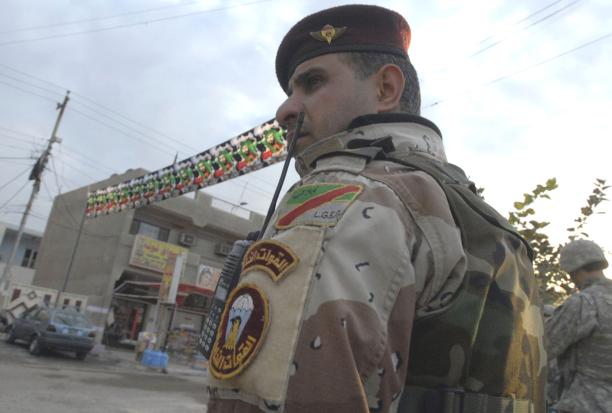
FORWARD OPERATING BASE
FALCON, Iraq — Capt. Monqaith, 4th Company, 1st Battalion,
24th Brigade,
6th Iraqi Army Division, leads a combined patrol Jan. 9 with
Soldiers from Company B, 1st Battalion,
22nd Infantry Regiment, in the Saydiyah community of the Rashid
district. The Iraqi Security Forces partnered
with their Coalition Forces counterparts to conduct inspections
on potential polling sites in southern Baghdad
for the upcoming provincial elections Jan. 31. The Soldiers of
Co. B are assisting the ISF to identify security risks
and develop force protection measures for the milestone event.
(U.S. Army photo by Sgt. 1st Class Brent Williams, 1st BCT PAO, 4th Inf. Div., MND-B)
Mission priorities have changed
many times for the mechanized infantry company assigned to the
“Regulars” Bn., which was assigned
to six different battalions and part of two brigades since the
1st “Raider” Brigade deployed to the Rashid district in
southern Baghdad,
said Capt. Ed Kennedy, commander of Co. B, 1st Bn., 22nd
Inf. Regt., 1st BCT, 4th Inf. Div. However, the mission
remains the same
for the Soldiers, who, after Jan. 1, officially transitioned into
a supporting role for the ISF’s ongoing mission to provide
security
and stability for the people of Baghdad and Iraq, explained
Kennedy. “It’s not really how we accomplish the mission
that has changed;
I am still getting rid of insurgents, building the economy and
building on the local governance,” said Kennedy, a native of
Danbury, Conn.
“We are still detaining insurgents; we’re still doing
the projects; we’re still working with the Neighborhood
Advisory Council and support councils.”
The unit is accustomed to operating in a position of providing
over watch for ISF operations, conducting combined patrols
and warrant-based targeting from its previous missions in
northwestern Baghdad and around Sadr City. The biggest difference
now
is that Coalition Forces will not operate independently of ISF,
explained Kennedy. All patrols and operations will be 100 percent
partnered with the Iraqi Army, National Police or Iraqi Police. Co.
B was recently co-located at a joint security station
in the Saydiyah community with NP from the 5th Bde., 2nd NP Div.,
and the “Regulars” Battalion’s NP
Transition Team.
Their new location enhances the unit’s mission of not only
providing support but also to teaching and training the ISF,
said Kennedy, who is serving his second tour in support of OIF.
The NPTT training is a critical
mission in support of the ISF as Iraqi forces strive to provide
security for their nation,
said Spc. Francisco Medina-Cardona, a combat medic assigned to Headquarters
and Headquarters Company, 1st Bn., 22nd Inf. Regt.
“The change has not been too big because we have always been
working with the ISF,” he said. “They have really taken
control of the situation,
taken the initiative and are working harder so that we can
actually start to give them their jobs back.”
In accordance with the SFA, the implementation of probably the
biggest change for combined operations in the Rashid district,
warrant-based targeting requires that U.S. Forces work with the
Iraqi Judicial System and the BOC to acquire a warrant before
detaining
suspected criminals and terrorists, a system resembling the
American law enforcement model, said 1st Lt. Sean Supon,
an infantry scout platoon leader, assigned to HHC, 1st
Bn., 22nd Inf. Regt.
Warrant-based targeting is a more efficient model for conducting
security operations and pushing suspects and criminals
through the Iraqi Judicial System, added Supon, who recently
completed a five-day training exercise with the Iraqi NP
on sensitive site exploitation, crime scene investigations and
time-sensitive raids.
“I think it is a drastic change,” said Supon, a native
of Kauai, Hawaii. “Look at the reports at the end of the
week … it is not just the CF
who are catching bad guys or finding weapons caches anymore.
Almost the majority of the missions that are successful now
are combined or exclusively run by the Iraqis.”
The Iraqi Army worked hard to
earn the trust of the Iraqi people by getting the terrorists and
criminals out of the communities
and neighborhoods, said Pfc. Lucas Haefele, a fire support
specialist attached to Co. B, 1st Bn., 22nd Inf. Regt.
“Iraqi informants working with the ISF are a lot more
reliable than our informants, and in my opinion, trust the Iraqi
Army
a little more than they do us,” said Haefele, who hails from
Argyle, Texas.
The ISF already took the lead in operations, said Haefele, and
will be ready when the enemy tries to test Baghdad’s gains
in security.
“We’re still kind of like their big brothers,” he
added. “They look up to us still and we kind of guide them.
They are good people;
they come out to talk to us, everybody, and if they don’t
speak a lick of English they still try to talk to us.”
The implementation of the
Security Agreement may fundamentally change the way that the line
units operate,
but it doesn’t make the mission more difficult, said Sgt.
1st Class Johnny Monds, platoon sergeant, Co. B, 1st Bn.,
22nd Inf. Regt.
“We’re basically used to the way we are running
now,” said Monds, who calls Hazel, Texas home. “The
most major change,
warrant-based targeting – witnesses and evidence —
makes us get a little more involved in our aspect of it.”
The work just began for the Iraqis, and the ISF are the
“brunt of the workforce,” but the Security Agreement is
the next step
in helping the nation grow and become more independent, starting
with the laws and the rulings, said Monds.
The Soldiers of Co. B are currently assisting
the ISF inspect polling sites, helping the Iraqis to assess the
buildings,
develop force protection, and identify any potential threats for
the provincial elections scheduled for the end of January.
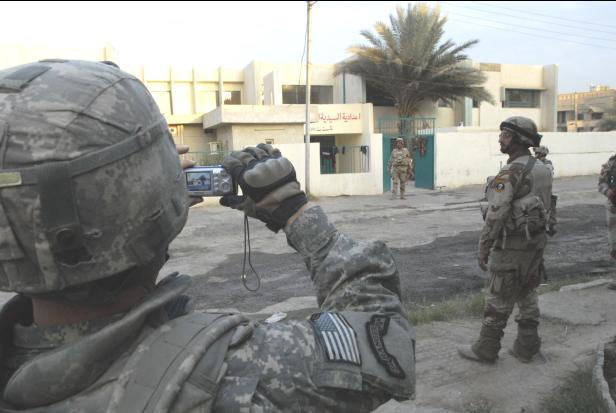
FORWARD OPERATING BASE
FALCON, Iraq — Sgt. 1st Class Johnny Monds, an infantry
platoon sergeant
from Hazel, Texas, assigned to Company B, 1st Battalion, 22nd
Infantry Regiment, 1st Brigade Combat Team,
4th Infantry Division, Multi-National Division – Baghdad,
snaps photos of a primary school Jan. 9 in the
Saydiyah community of the Rashid district during a security
patrol to inspect potential polling sites for the
upcoming provincial elections. The Soldiers of "Bear"
Co. partnered with Iraqi Army soldiers from 4th Company,
1st Battalion, 24th Brigade, 6th Iraqi Army Division, to identify
necessary force protection measures
to secure upcoming provincial elections scheduled for Jan. 31.
(U.S. Army photo by Sgt. 1st Class Brent Williams, 1st BCT PAO, 4th Inf. Div., MND-B)
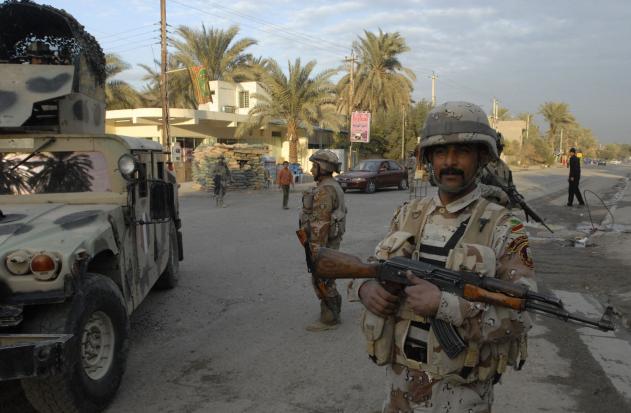
FORWARD OPERATING BASE
FALCON, Iraq — Iraqi Army soldiers from 4th Company, 1st
Battalion, 24th Brigade,
6th IA Division, operate a traffic control point in the Saydiyah
community of the Rashid district in southern Baghdad, Jan. 9.
Soldiers of 1st Brigade Combat Team, 4th Infantry Division,
Multi-National Division – Baghdad, partnered with their
Iraqi Security Forces counterparts to assess polling sites and
identify force protection needs for the upcoming provincial
elections Jan. 31.
(U.S. Army photo by Sgt. 1st Class Brent Williams, 1st BCT PAO, 4th Inf. Div., MND-B)
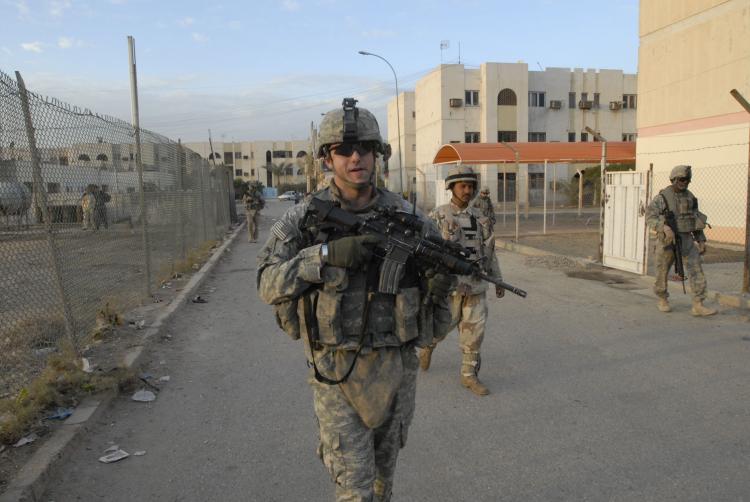
FORWARD OPERATING BASE
FALCON, Iraq — Staff Sgt. David Bishop, an infantry squad
leader from Fort Hood, Texas,
assigned to Company B, 1st Battalion, 22nd Infantry Regiment,
patrols with his Soldiers and Iraqi Army soldiers
from 4th Company, 1st Battalion, 24th Brigade, 6th Iraqi Army
Division, during combined security operations Jan. 9
in the Saydiyah community of the Rashid district in southern
Baghdad. The Soldiers of "Bear" Co. partnered with
their Iraqi Security Forces counterparts to assess potential
polling sites for the upcoming provincial elections Jan. 31.
(U.S. Army photo by Sgt. 1st Class Brent Williams, 1st BCT PAO, 4th Inf. Div., MND-B)
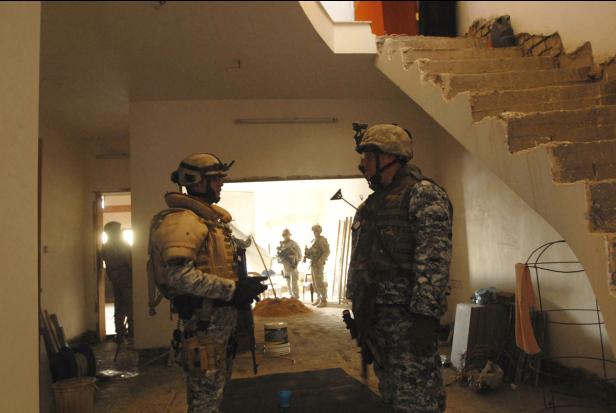
FORWARD OPERATING BASE
FALCON, Iraq — Iraqi National Policemen from 1st Company,
1st Battalion,
5th Brigade, 2nd National Police Division, search an Iraqi
residence for weapons during combined cordon and knock operations
Jan. 8 with Soldiers from the 1st Brigade Combat Team, 4th
Infantry Division, Multi-National Division – Baghdad,
in the Saydiyah community of southern Baghdad's Rashid district.
Soldiers of Company B, "Bear," 1st Battalion,
22nd Infantry Regiment, 1st BCT, 4th Inf. Div., partnered with
the Iraqi Security Forces
to assist in the operation to enforce Baghdad's
"Weapons-Free Policy."
(U.S. Army photo by Sgt. 1st Class Brent Williams, 1st BCT PAO, 4th Inf. Div., MND-B)
Home | Photos | Battles & History | Current |
Rosters & Reports | Medal of Honor | Killed
in Action |
Personnel Locator | Commanders | Station
List | Campaigns |
Honors | Insignia & Memorabilia | 4-42
Artillery | Taps |
What's New | Editorial | Links |